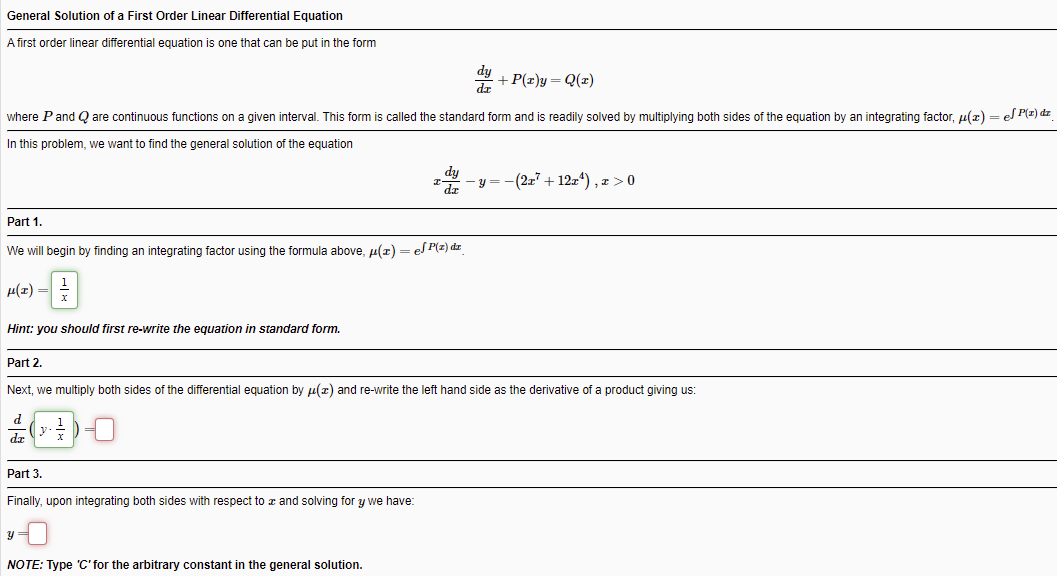A first order linear differential equation is one that can be put in the form +P(z)y=Q(z) where P and Q are continuous functions on a given interval. This form is called the standard form and readily solved by multiplying both sides of the equation by an integrating factor, µ(z) = eS P(z) & In this problem, we want to find the general solution of the equation dy - y =-(2z" + 12x*) , z > 0 Part 1 We will begin by finding an integrating factor using the formula above, u(z) = es P(z) de µ(x) = Hint: you should first re-write the equation in standard form. Part 2. Next, we multiply both sides of the differential equation by u(z) and re-write the left hand side as the derivative of a product giving us: P dz Part 3. Finally, upon integrating both sides with respect to z and solving for y we have:
A first order linear differential equation is one that can be put in the form +P(z)y=Q(z) where P and Q are continuous functions on a given interval. This form is called the standard form and readily solved by multiplying both sides of the equation by an integrating factor, µ(z) = eS P(z) & In this problem, we want to find the general solution of the equation dy - y =-(2z" + 12x*) , z > 0 Part 1 We will begin by finding an integrating factor using the formula above, u(z) = es P(z) de µ(x) = Hint: you should first re-write the equation in standard form. Part 2. Next, we multiply both sides of the differential equation by u(z) and re-write the left hand side as the derivative of a product giving us: P dz Part 3. Finally, upon integrating both sides with respect to z and solving for y we have:
Calculus: Early Transcendentals
8th Edition
ISBN:9781285741550
Author:James Stewart
Publisher:James Stewart
Chapter1: Functions And Models
Section: Chapter Questions
Problem 1RCC: (a) What is a function? What are its domain and range? (b) What is the graph of a function? (c) How...
Related questions
Question
Where does it go wrong? PLEASE CIRCLE AND LABEL ANSWERS

Transcribed Image Text:General Solution of a First Order Linear Differential Equation
A first order linear differential equation is one that can be put in the form
dy
dr
+ P(z)y = Q(x)
where Pand Q are continuous functions on a given interval. This form is called the standard form and is readily solved by multiplying both sides of the equation by an integrating factor, u(x) = el P(x) dz
In this problem, we want to find the general solution of the equation
fip
- y = -(2x" + 12z“) , z > 0
Part 1.
We will begin by finding an integrating factor using the formula above, u(z) = el P(z) dr
µ(z) =
Hint: you should first re-write the equation in standard form.
Part 2.
Next, we multiply both sides of the differential equation by u(x) and re-write the left hand side as the derivative of a product giving us:
d
( y
dr
Part 3.
Finally, upon integrating both sides with respect to z and solving for y we have:
y =
NOTE: Type 'C' for the arbitrary constant in the general solution.
Expert Solution
This question has been solved!
Explore an expertly crafted, step-by-step solution for a thorough understanding of key concepts.
Step by step
Solved in 2 steps

Recommended textbooks for you

Calculus: Early Transcendentals
Calculus
ISBN:
9781285741550
Author:
James Stewart
Publisher:
Cengage Learning

Thomas' Calculus (14th Edition)
Calculus
ISBN:
9780134438986
Author:
Joel R. Hass, Christopher E. Heil, Maurice D. Weir
Publisher:
PEARSON

Calculus: Early Transcendentals (3rd Edition)
Calculus
ISBN:
9780134763644
Author:
William L. Briggs, Lyle Cochran, Bernard Gillett, Eric Schulz
Publisher:
PEARSON

Calculus: Early Transcendentals
Calculus
ISBN:
9781285741550
Author:
James Stewart
Publisher:
Cengage Learning

Thomas' Calculus (14th Edition)
Calculus
ISBN:
9780134438986
Author:
Joel R. Hass, Christopher E. Heil, Maurice D. Weir
Publisher:
PEARSON

Calculus: Early Transcendentals (3rd Edition)
Calculus
ISBN:
9780134763644
Author:
William L. Briggs, Lyle Cochran, Bernard Gillett, Eric Schulz
Publisher:
PEARSON

Calculus: Early Transcendentals
Calculus
ISBN:
9781319050740
Author:
Jon Rogawski, Colin Adams, Robert Franzosa
Publisher:
W. H. Freeman


Calculus: Early Transcendental Functions
Calculus
ISBN:
9781337552516
Author:
Ron Larson, Bruce H. Edwards
Publisher:
Cengage Learning